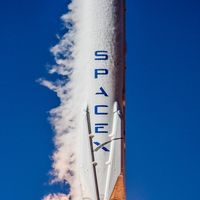Amazon's Kuiper Project: A New Challenger in the Satellite Internet Race
April 29, 2025, 11:07 pm

Location: United States, District of Columbia, Washington
Employees: 5001-10000
Founded date: 2002
Total raised: $7.53B

Location: United States, Colorado, Centennial
Employees: 1001-5000
Founded date: 2006
In the high-stakes arena of satellite internet, Amazon has thrown its hat into the ring. The tech giant recently launched 27 satellites for Project Kuiper, its ambitious broadband initiative aimed at rivaling SpaceX’s Starlink. This launch, which took place on April 28, 2025, marks a significant milestone in Amazon's quest to provide global high-speed internet coverage.
The satellites lifted off from Cape Canaveral, Florida, aboard a United Launch Alliance (ULA) rocket. This launch was initially delayed due to inclement weather, but the skies cleared just in time for Amazon to make its move. With plans to deploy over 3,200 satellites into low-Earth orbit, Amazon is betting big on bridging connectivity gaps, particularly in rural and underserved communities.
Amazon's commitment to Project Kuiper is no small feat. The company has invested over $10 billion into this venture, signaling its serious intent to carve out a space in the satellite broadband market. The goal is to begin customer pilots by 2026, with an ambitious expansion plan that stretches into the following years. This is not just a game of catch-up; it’s a strategic play to redefine internet access for millions.
The timing of Amazon's launch is crucial. On the same day, SpaceX deployed additional batches of its Starlink satellites, further solidifying its dominance in the satellite internet sector. With over 7,200 satellites already in orbit and service to more than five million customers across 70 countries, SpaceX has set a high bar. The company’s reusable launch system allows it to deploy satellites rapidly and cost-effectively, creating a formidable barrier for newcomers.
Despite its late entry, analysts believe Amazon has the resources and infrastructure to mount a serious challenge. The company’s deep pockets and robust technological foundation give it a fighting chance. While SpaceX operates a tightly integrated launch system, Amazon is leveraging multiple partners to achieve its goals. This difference in approach could shape the competitive landscape in the coming years.
Experts predict that the market for low-Earth orbit broadband will grow at an unprecedented pace. As both companies expand their satellite constellations, the competition will intensify. There’s room for multiple players, but the road ahead won’t be easy. Amazon’s strategy focuses on leveraging its existing cloud services through Amazon Web Services (AWS) to support edge computing and data integration. This could provide a significant advantage in delivering reliable internet services.
The launch of Project Kuiper is just the beginning. Amazon plans to deploy hundreds more satellites in the next two years, with the ultimate goal of achieving global coverage by the end of the decade. This ambition is not just about competition; it’s about changing the way people connect. The promise of high-speed internet access can transform lives, especially in areas where connectivity has been a persistent challenge.
The stakes are high. As the two tech titans vie for supremacy, the implications extend beyond business. Internet access is increasingly viewed as a fundamental right. The ability to connect to the digital world can open doors to education, healthcare, and economic opportunities. In this context, Amazon’s entry into the satellite internet market could be a game-changer.
However, challenges remain. The satellite internet market is fraught with technical hurdles and regulatory complexities. Amazon must navigate these waters carefully to avoid pitfalls. The company’s reliance on multiple partners for satellite launches could introduce vulnerabilities. Coordination and execution will be key to ensuring timely deployments and operational success.
Moreover, as Amazon embarks on this journey, it must also contend with public perception. The company has faced scrutiny over its business practices and impact on local economies. Building trust with potential customers will be essential. Transparency and accountability will play a crucial role in shaping the narrative around Project Kuiper.
In conclusion, Amazon's launch of its first satellites for Project Kuiper marks a pivotal moment in the satellite internet race. With significant investments and a clear vision, the company is poised to challenge SpaceX’s dominance. The competition promises to drive innovation and expand access to high-speed internet for millions. As the battle unfolds, the world will be watching closely. The future of connectivity hangs in the balance, and the stakes have never been higher.
The satellites lifted off from Cape Canaveral, Florida, aboard a United Launch Alliance (ULA) rocket. This launch was initially delayed due to inclement weather, but the skies cleared just in time for Amazon to make its move. With plans to deploy over 3,200 satellites into low-Earth orbit, Amazon is betting big on bridging connectivity gaps, particularly in rural and underserved communities.
Amazon's commitment to Project Kuiper is no small feat. The company has invested over $10 billion into this venture, signaling its serious intent to carve out a space in the satellite broadband market. The goal is to begin customer pilots by 2026, with an ambitious expansion plan that stretches into the following years. This is not just a game of catch-up; it’s a strategic play to redefine internet access for millions.
The timing of Amazon's launch is crucial. On the same day, SpaceX deployed additional batches of its Starlink satellites, further solidifying its dominance in the satellite internet sector. With over 7,200 satellites already in orbit and service to more than five million customers across 70 countries, SpaceX has set a high bar. The company’s reusable launch system allows it to deploy satellites rapidly and cost-effectively, creating a formidable barrier for newcomers.
Despite its late entry, analysts believe Amazon has the resources and infrastructure to mount a serious challenge. The company’s deep pockets and robust technological foundation give it a fighting chance. While SpaceX operates a tightly integrated launch system, Amazon is leveraging multiple partners to achieve its goals. This difference in approach could shape the competitive landscape in the coming years.
Experts predict that the market for low-Earth orbit broadband will grow at an unprecedented pace. As both companies expand their satellite constellations, the competition will intensify. There’s room for multiple players, but the road ahead won’t be easy. Amazon’s strategy focuses on leveraging its existing cloud services through Amazon Web Services (AWS) to support edge computing and data integration. This could provide a significant advantage in delivering reliable internet services.
The launch of Project Kuiper is just the beginning. Amazon plans to deploy hundreds more satellites in the next two years, with the ultimate goal of achieving global coverage by the end of the decade. This ambition is not just about competition; it’s about changing the way people connect. The promise of high-speed internet access can transform lives, especially in areas where connectivity has been a persistent challenge.
The stakes are high. As the two tech titans vie for supremacy, the implications extend beyond business. Internet access is increasingly viewed as a fundamental right. The ability to connect to the digital world can open doors to education, healthcare, and economic opportunities. In this context, Amazon’s entry into the satellite internet market could be a game-changer.
However, challenges remain. The satellite internet market is fraught with technical hurdles and regulatory complexities. Amazon must navigate these waters carefully to avoid pitfalls. The company’s reliance on multiple partners for satellite launches could introduce vulnerabilities. Coordination and execution will be key to ensuring timely deployments and operational success.
Moreover, as Amazon embarks on this journey, it must also contend with public perception. The company has faced scrutiny over its business practices and impact on local economies. Building trust with potential customers will be essential. Transparency and accountability will play a crucial role in shaping the narrative around Project Kuiper.
In conclusion, Amazon's launch of its first satellites for Project Kuiper marks a pivotal moment in the satellite internet race. With significant investments and a clear vision, the company is poised to challenge SpaceX’s dominance. The competition promises to drive innovation and expand access to high-speed internet for millions. As the battle unfolds, the world will be watching closely. The future of connectivity hangs in the balance, and the stakes have never been higher.
